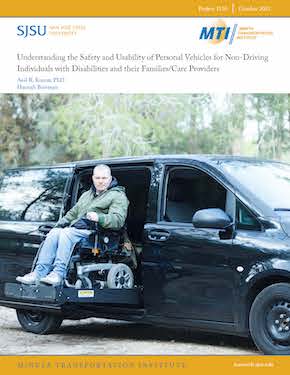- 408-924-7560
- mineta-institute@sjsu.edu
- Donate
Understanding the Safety and Usability of Personal Vehicles for Non-Driving Individuals with Disabilities and their Families/Care Providers
The connections between shared personal vehicles of individuals with disabilities (IWDs) and their household family members play an important role in the mobility, overall health, and well-being of all involved actors, yet this topic remains mostly overlooked within publicly available research. Families that include a non-driving IWD are more likely to be low-income, and often struggle with the costs of operating a family car but, due to insufficient public transportation options, they own vehicles despite their prohibitive cost. This exploratory study utilized the Systems Engineering Initiative for Patient Safety (SEIPS) model, a framework focused on assessing the interplaying sociotechnical factors that contribute toward work-systems to gain a holistic understanding of the factors that influence household vehicles, safety, and a sense of well-being for non-driving IWDs and their household family members. A combined effort of surveys, interviews, qualitative coding, and statistical analysis (including one-way ANOVA) revealed a series of influential factors, including: (1) slow bureaucratic processes for vehicle funding; (2) error-prone modifications including lift and tie-downs; (3) miscommunications between IWDs and family members; and (4) residential area development and subsequent social support. Findings highlight the need for improved access to government funding, more reliable modification equipment, and interior vehicle designs that consider better social integration for IWDs.
ANIL R. KUMAR, PHD
Dr. Kumar is currently working as an Associate Professor in the Department of Industrial and Systems Engineering (ISE) at San Jose State University, San Jose, CA. He is also the Director of the Master’s Program in Human Factors and Ergonomics in the ISE department of San Jose State University.
HANNAH BOWMAN
Hannah is pursuing her MSc in Human Factors/Ergonomics program at the San Jose State University while conducting this research.
-
Contact Us
San José State University One Washington Square, San Jose, CA 95192 Phone: 408-924-7560 Email: mineta-institute@sjsu.edu






